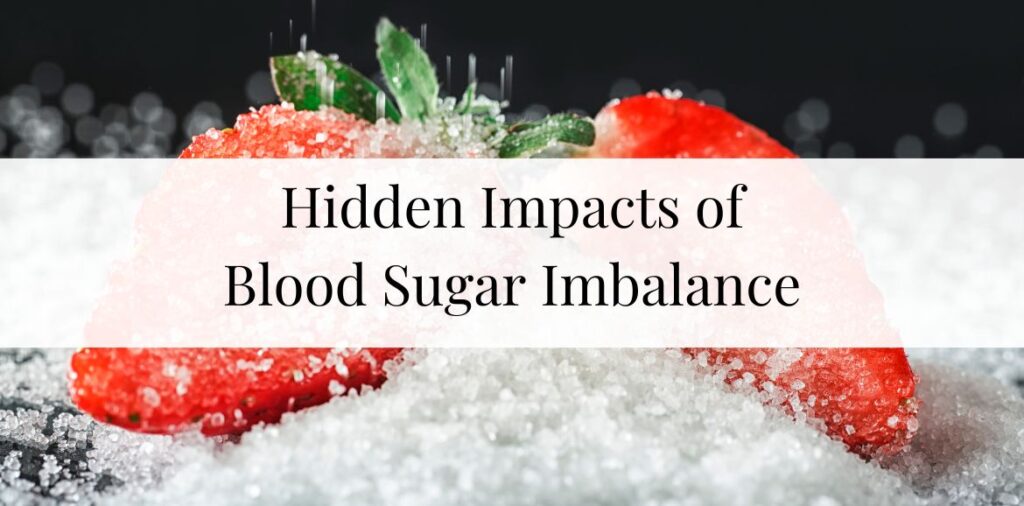
Uncovering the Hidden Impacts of Blood Sugar Imbalance
Have you ever wondered if hidden blood sugar imbalances could be silently sabotaging your health? From unexplained weight gain to mood swings, these subtle signs can point to bigger issues. In this blog post, we’ll uncover the surprising ways blood sugar affects your body, reveal what happens when you consume too much sugar, and share actionable tips to regain control. Ready to transform your health? Keep reading to discover how!
Recognizing the Signs of Blood Sugar Imbalance
Many people think they can identify blood sugar problems by how they feel, but that’s not always the case. The only way to know for sure is through testing. However, there are several outward signs that can indicate potential issues:
- Belly fat
- Sugar cravings
- Energy crashes
- Brain fog
- Mood swings
- Skin tags
- Darkened skin creases
These signs give us clues that you may have insulin resistance, where your cells become less responsive to insulin and less effective at using glucose from your blood as energy. If left unchecked, insulin resistance can also fuel inflammation, fatigue, weight struggles, and heart disease.
What Happens When You Eat Too Much Sugar
Let’s take a closer look at what happens at the cellular level when you consume too much sugar, like that iced latte. When sugar hits your digestive tract, it gets absorbed into your bloodstream as glucose (aka blood sugar). This triggers beta cells in your pancreas to release insulin, a hormone that facilitates the movement of glucose into cells to be used as energy.
Sounds great, right? Except, because of the sudden and large spike in blood sugar from something like a latte, you also get a large spike in insulin. This causes glucose to be quickly moved into cells, leading to a dramatic drop in blood sugar—a crash.
This crash can result in hunger, cravings, shakiness, brain fog, fatigue, and anxiety. Our bodies weren’t designed to handle excessive sugar intake, and if repeated day in and day out, it becomes the main cause of insulin resistance.
Controllable Factors Influencing Blood Sugar Balance
While genetics and age are factors we can’t control, there are several other factors influencing blood sugar balance that we can manage:
- Diet: Consuming a balanced diet with healthy fats, fiber, and protein can help regulate blood sugar levels.
- Exercise: Regular physical activity helps improve insulin sensitivity.
- Stress: Managing stress through techniques like meditation, yoga, or deep breathing can prevent cortisol spikes.
- Hormones: Balancing hormones through lifestyle changes and, if necessary, medical interventions can help.
- Sleep: Ensuring you get enough quality sleep is crucial for maintaining healthy blood sugar levels.
By optimizing these controllable factors, you set yourself up for a lifetime of better health.
The Vicious Cycle of Stress and Sugar
Stress and sugar intake are closely linked in a vicious cycle. When you’re stressed, your body produces cortisol and adrenaline, which increase glucose in your blood to provide energy for a “fight or flight” response. But when you’re not actually running from danger, that spike in blood sugar is unnecessary and can contribute to insulin resistance over time.
Conversely, consuming excess sugar or refined carbs leads to a sugar spike followed by a crash, which your body perceives as stress. This prompts the release of cortisol and adrenaline, perpetuating the cycle. Identifying whether stress or sugar is the primary driver for you can be a crucial step in breaking this cycle.
Sugar and Aging
Not to be dramatic, but sugar can make you age faster. Sugar spikes cause a biochemical process called glycation, leading to the production of advanced glycation end products (AGEs). These AGEs accumulate in the skin, compromise collagen, and contribute to fine lines, wrinkles, and sagging skin.
While glycation is a natural process that increases with age, diets high in sugar or refined carbs without a balance of healthy fats, fiber, and protein accelerate this process. Reducing sugar intake can help slow down the aging process, keeping your skin youthful and healthy.
Understanding and managing blood sugar levels is vital for overall health. By recognizing the signs of imbalance, knowing what happens when you consume too much sugar, and optimizing factors you can control, you can significantly improve your well-being.
Are you ready to take control of your health and optimize your blood sugar balance? At Wholistic Functional Health, we create personalized health plans tailored to your unique needs. Book a free discovery call today and find out how we can help you achieve a healthier, more energetic, vibrant you. Click [here] to schedule your call and take the first step towards better health.






